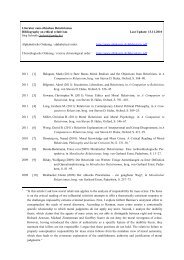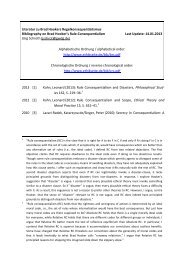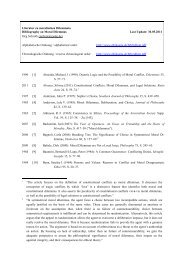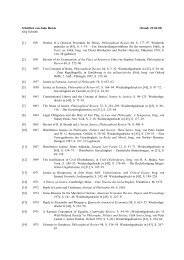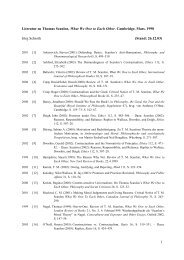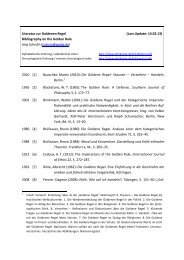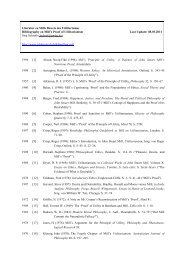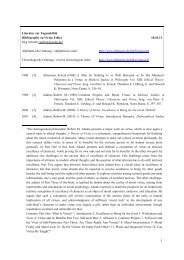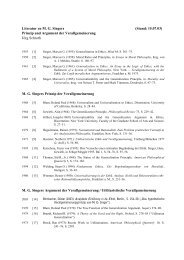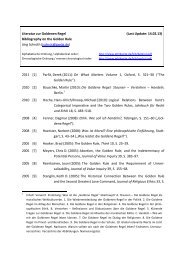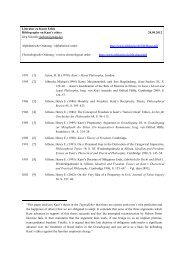Chronologische - Ethikseite
Chronologische - Ethikseite
Chronologische - Ethikseite
You also want an ePaper? Increase the reach of your titles
YUMPU automatically turns print PDFs into web optimized ePapers that Google loves.
2011 [41] Grenberg, Jeanine (2011): Making Sense of the Relationship of Reason and Sensibility in<br />
Kant’s Ethics, Kantian Review 28, S. 461–72. 16 – Zu [70].<br />
2011 [42] Guyer, Paul (2011): Kantian Perfectionism, in Perfecting Virtue. New Essays on Kantian<br />
Ethics and Virtue Ethics, hrsg. von Lawrence Jost und Julian Wuerth, Cambridge, S.<br />
194–214.<br />
2011 [43] Herman, Barbara (2011): A Mismatch of Methods, in Derek Parfit, On What Matters Volume<br />
2, Oxford, S. 83–115.<br />
2011 [44] Herman, Barbara (2011): The Difference that Ends Make, in Perfecting Virtue. New Essays on<br />
Kantian Ethics and Virtue Ethics, hrsg. von Lawrence Jost und Julian Wuerth,<br />
Cambridge, S. 92–115.<br />
2011 [45] Jost, Lawrence/Wuerth, Julian (Hrsg.) (2011): Perfecting Virtue. New Essays on Kantian<br />
Ethics and Virtue Ethics, Cambridge.<br />
2011 [46] Kontos, Pavlos (2011): Kant’s Categories of Freedom as Rules of Moral Salience, Zeitschrift<br />
für philosophische Forschung 65, S. 218–40. 17<br />
2011 [47] Mikkola, Mari (2011): Kant on Moral Agency and Women’s Nature, Kantian Review 16, S.<br />
89–111. 18<br />
2011 [48] Onof, Christian (2011): Moral Worth and Inclinations in Kantian Ethics, Kant Studies Online<br />
(April 2011), S. 1–46, http://www.kantstudiesonline.net.<br />
2011 [49] Parfit, Derek (2011): On What Matters Volume 1, Oxford, S. 177–342 (8. Possible Consent. 9.<br />
Merely as a Means. 10. Respect and Value. 11. Free Will and Desert. 12. Universal<br />
Groundwork of the Metaphysics of Morals, however, are said to support only a weaker requirement, namely,<br />
that a maxim conform to a universal law. Hence, Kant omits at least one necessary substantive premise of<br />
the derivation. This paper attempts to show that nothing substantive is omitted from the argument. It only<br />
needs two principles of inference that it is assumed add nothing substantive to the premises.”<br />
16 “In this essay, I look at some claims Anne Margaret Baxley makes, in her recent book Kant’s Theory of<br />
Virtue: The Value of Autocracy, about the relationship between reason and sensibility in Kant’s theory of<br />
virtue. I then reflect on tensions I find in these claims as compared to the overall goal of her book: an<br />
account of Kant’s conception of virtue as autocracy. Ultimately, I argue that interpreters like Baxley (and<br />
myself) who want to welcome a more robust role for feeling in Kantian ethics must, in order to achieve our<br />
purposes, move beyond the general account of the limits for the role of the moral feeling of respect in the<br />
grounding of Kant’s ethics which Henry Allison established in his influential Kant’s Theory of Freedom.”<br />
17 “This paper attempts to bring to light and to justify the double task that Kant confers on the categories of<br />
freedom. It will be maintained that the categories of freedom do not only function as the ratio cognoscendi<br />
of free actions within the sensible world but they are also well appropriated to ground the concepts of the<br />
good and the evil as genuine rules of moral salience (according to Herman’s well-known label), that is to<br />
say, as rules of how to detect and appraise circumstances and deeds bestowed with moral significance.”<br />
18 “Some commentators have condemned Kant’s moral project from a feminist perspective based on Kant’s<br />
apparently dim view of women as being innately morally deficient. Here I will argue that although his<br />
remarks concerning women are unsettling at first glance, a more detailed and closer examination shows that<br />
Kant’s view of women is actually far more complex and less unsettling than that attributed to him by<br />
various feminist critics. My argument, then, undercuts the justification for the severe feminist critique of<br />
Kant’s moral project.”



